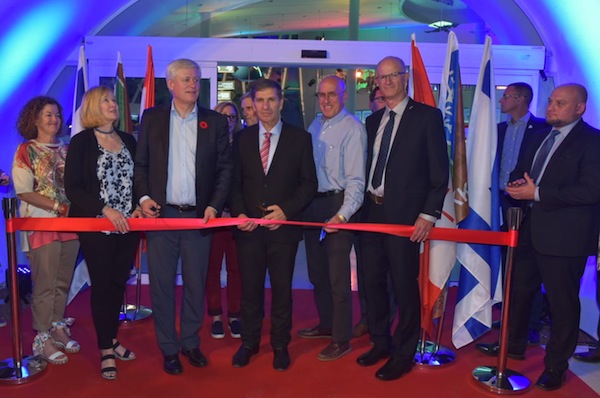Laureen and Stephen Harper, centre left, and Daniel Atar, KKL-JNF world chair, centre, were among those who cut the ribbon at the Nov. 6 official opening of the Stephen J. Harper Hula Valley Bird Sanctuary Visitor and Education Centre. (photo by Michael Huri)
Former Canadian prime minister Stephen Harper was in Israel earlier this month for a four-day visit with a delegation from the Jewish National Fund of Canada, where he took part in the dedication of the new visitors centre at JNF Lake Hula Park in northern Israel, which is named in his honour.
Budgeted at $25 million Cdn, one-fifth of which was raised by the JNF of Canada, the Stephen J. Harper Hula Valley Bird Sanctuary Visitor and Education Centre south of Qiryat Shmona is seen as “the flagship project of Keren-Kayemet L’Yisrael (KKL),” the JNF’s Israel-based sister organization. Harper contributed to the cost of the project, and the auditorium is named for his wife, Laureen, in recognition of her service to Canada, friendship to Israel and dedication to the preservation of nature and wildlife.
Stephen Harper was honoured at the JNF of Canada’s 2013 Negev Dinner in Toronto. At the time, then-JNF chief executive officer Josh Cooper said: “Given his well-documented love of animals, we felt this would be an appropriate project to present to him.”
Now completed, six years after fundraising began, the facility promises to transform the experience of ornithologists and bird watchers who come to the Hula Valley. There, they can watch the twice-a-year seasonal migration of 500 million birds from more than 500 species, from Europe and Central Asia to Africa, and back.
The Hula Valley, located in the shadow of Mount Hermon, is considered the crown jewel of Israeli conservation efforts. Known in the Bible as Merom, up until the 1950s, it was full of swampland that was notorious for breeding malaria-carrying anopheles mosquitoes. In the 1950s, the wetlands were drained, with the hope that fertile farmland would result; instead, environmental devastation and the extinction of some indigenous species followed. Farming in the area was never successful and JNF ultimately decided to reflood part of the former lake.
Known in Hebrew as Agamon Hula (Little Lake Hula), the flat valley is filled with an array of birds, including cranes, pelicans and eagles. Visitors can observe the birds and also cycle around the site.
***
At the gala dinner Nov. 5 in honour of Harper, which took place at the Waldorf Astoria Hotel in Jerusalem, Israeli Prime Minister Binyamin Netanyahu spoke about the danger Iran’s nuclear ambitions poses for Israel, the Middle East and the West.
“Iran expands its aggression everywhere. It seeks to envelop Israel. It seeks to threaten Israel. It seeks to destroy Israel. We fight back,” Netanyahu said. “I also want to say, given Iran’s efforts to expand its nuclear weapons program, expand its enrichment of uranium for making atomic bombs, I repeat here once again – we will never let Iran develop nuclear weapons. This is not only for our security and our future; it’s for the future of the Middle East and the world.”
Netanyahu was particularly concerned about Tehran’s plans to start injecting UF6 (uranium hexafluoride) gas into the centrifuges to enrich uranium to five percent at the heavily fortified underground Fordow Fuel Enrichment Plant, located inside a mountain 32 kilometres northeast of the Shi’ite holy city of Qom.
Earlier in the day, Iran’s nuclear chief Ali Akbar Salehi promised that his country would violate the element of the 2015 nuclear deal known as the Joint Comprehensive Plan of Action, which Tehran had worked out with the P5+1 (China, France, Germany, Russia, the United Kingdom and the United States). The United States left the deal last year and has imposed sanctions on Iran in an attempt to force it to renegotiate the document. Tehran, in turn, has begun violating the deal in an attempt to pressure the United States to recall the sanctions.
Under the 2015 agreement between Iran and world powers, Iran agreed to turn Fordow into a “nuclear, physics and technology centre,” where 1,044 centrifuges would be used for purposes other than enrichment, such as producing stable isotopes, which have a variety of civil uses. The deal bans nuclear material from Fordow and, by injecting UF6 into centrifuges, the facility will become an active nuclear site rather than a research plant as permitted under the pact.
***
Since leaving Parliament after the Conservative party was defeated in the 2015 federal election by the Liberals, Harper has become president of the Awz venture capital fund advisory committee. The fund, founded by managing partner Yaron Ashkenazi, specializes in investments in Israeli security and intelligence startups, and manages $100 million in assets. The fund has invested in 12 companies to date, according to the Israeli financial website Globes.
Harper, an enthusiastic supporter of Israel, has visited many times. On Jan. 20, 2014, he addressed the Knesset plenum, saying: “It is, thus, a Canadian tradition to stand for what is principled and just, regardless of whether it is convenient or popular. But, I would argue, support today for the Jewish state of Israel is more than a moral imperative, it is also of strategic importance, also a matter of our own, long-term interests…. For too many nations, it is still easier to scapegoat Israel than to emulate your success.”
About the education centre, he said in a statement, “This park is one of the greatest restoration stories, just like this country is to the Jewish people. It is a magnificent honour to have this centre named after my name, and I am grateful for this beautiful occasion.”
Gil Zohar is a writer and tour guide in Jerusalem, Israel.

